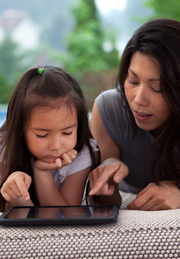Educating Kids on Possible Dangers Online
The conversation around keeping your children safe has come a long way from not talking to strangers and being home before dark. Internet safety for kids has become one of the most challenging parental discussions to have. It’s turning out to be a required conversation at a very young age.
Children are interacting online at increasingly higher rates than any other age group. The world wide web presents both a network of engaging content and opportunities for copious harmful interactions. It’s vital to have a comprehensive discussion about all the inherent dangers online.
Internet safety for kids is not as simple as limiting what websites they can access. The myriad forms of communication alone are almost impossible to keep track of in real time. These include popular platforms like Google Hangouts or Discord, which work very efficiently to allow for quick steaming video chat and instant voice applications. However, the trade off for this convenience can result in your home IP address being visible due to a WEBrtc leak. This is just one example of the dangers any child can face online.
While personal safety is paramount, it’s also vital to educate children on the impact their online presence can have. There is a plethora of examples of kids bullying or cyberstalking each other to the point of physical harm via online platforms. It’s just as essential to show the importance of being thoughtful of others online as it is to warn of other dangers.
Steps to Increase the Online Security Awareness
Children often confuse online security with unnecessary restrictions. It’s crucial to be honest with them about why security is so important. It can be difficult for the younger generation to understand such issues as stolen identities and hacking banking information. However, if you can teach them through certain behaviors and make them aware of potential danger zones, you will instill an appropriate view of online security.
Set Up Ground Rules
Limiting screen time or time on the internet has become a trendy way to handle children’s online behaviors. However, it’s getting increasingly difficult to achieve this lofty goal. School work, communication with friends, and gameplay have all been transported to the online world. Thus, it could be perceived as extremely limiting to simply say “only two hours of internet per day.”
However, some standard ground rules are reasonable and beneficial. For example, using the internet in a shared space like the dining or living room. It can help to limit inappropriate online activities. If you encourage children to share any messages or information they find offensive with you, it will help to discover bullying or cyberstalking before it becomes too impactful.
The key to the ground rules is being open and honest about why said rules exist. When using parental controls, do it openly so that it’s a positive thing based on your safety concerns, not something that will have a negative psychological effect. Clearly explaining what is good and bad on the internet will go a lot further than dictating what is off limits.
Utilize Built-In Security Settings and Features
Most operating systems take young family members into account with certain family-friendly features. Fortunately, these features go a lot further now than restricting certain websites or content.
For example, parents can allot funds to the kid’s online account to use them in the app store. This can remove the temptation for children to spend unbeknownst to parents. Additionally, parents can limit the time spent online with timers, restrict internet content or certain apps, and block the adjustment of specific system settings.
Be Mindful About Online Gaming
Online gaming has become more social than ever. Almost every game has some form of chat component, with many utilizing actual voice chat. Encouraging children to be wary of what information they divulge online is essential. While games are virtual and can always be reset, real information can put your family in danger.
Consider utilizing a VPN while gaming. A VPN can hide the IP address from other users. An IP address could be used to locate your home, even if the child doesn’t give away your exact location.
Be the Example
Internet safety for kids has become one of the most challenging aspects of parenting in modern times. Being honest about the dangers of online interactions is crucial. This, along with supplying legitimate reasons for online restrictions can ease the tension caused by discussions about the internet. Model good internet behaviors for children by adhering to the same ground rules as you ask them to follow.
Read about the psychological impact of parental controls on children.
Coaching children on the classic dangers online like communicating with strangers, accessing inappropriate content, and opening files or documents they are not sure about is vital. Children can often see the internet as an “imaginary realm,” where online friends only exist in the online world. Parents must make it plain to children that anything that happens online can lead to physical dangers.
Rather than attempting to only chase down all the potential dangers, it is far more efficient to educate children about digital responsibility and good online behavior, so they know how to interact properly with the vast world of the internet.




